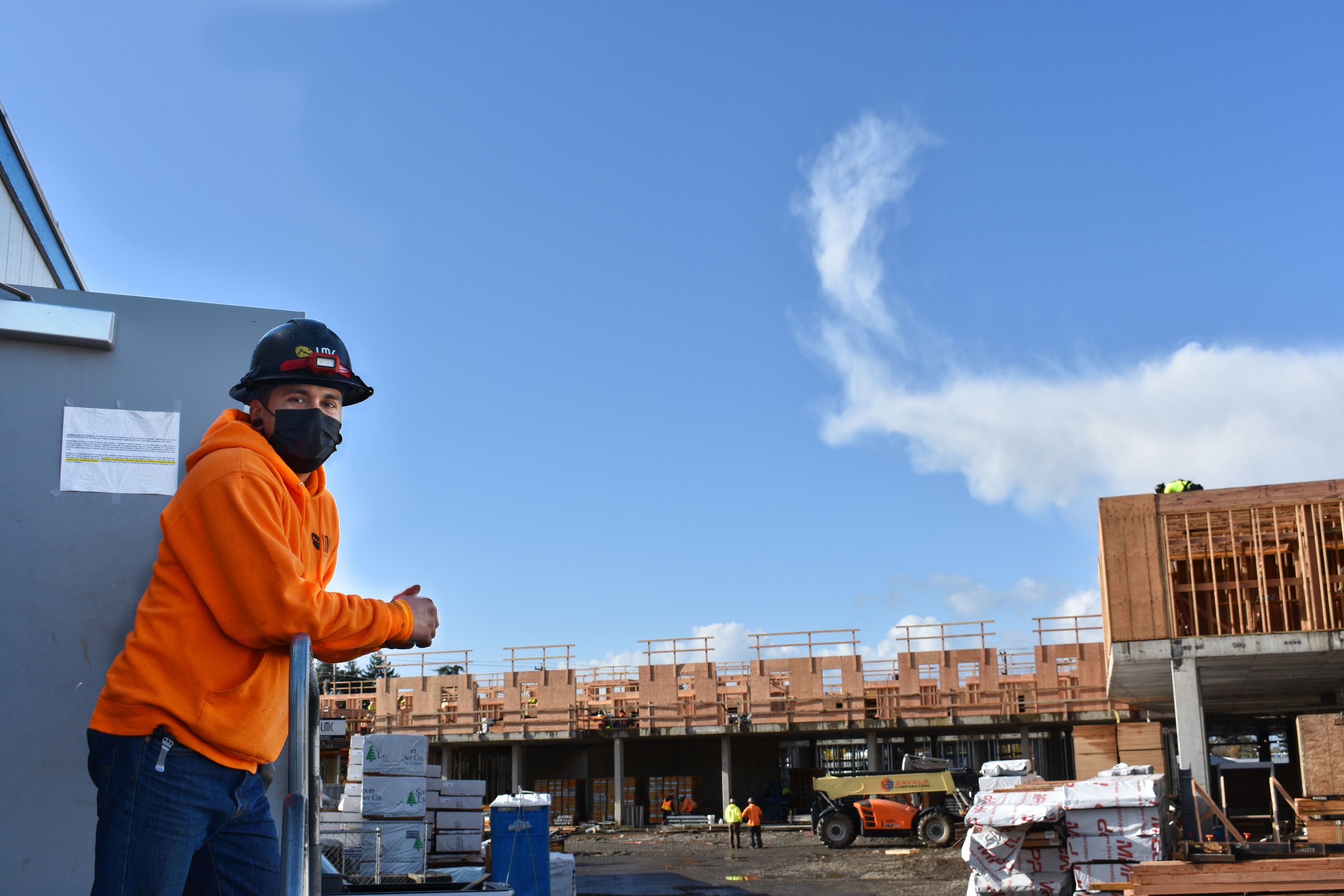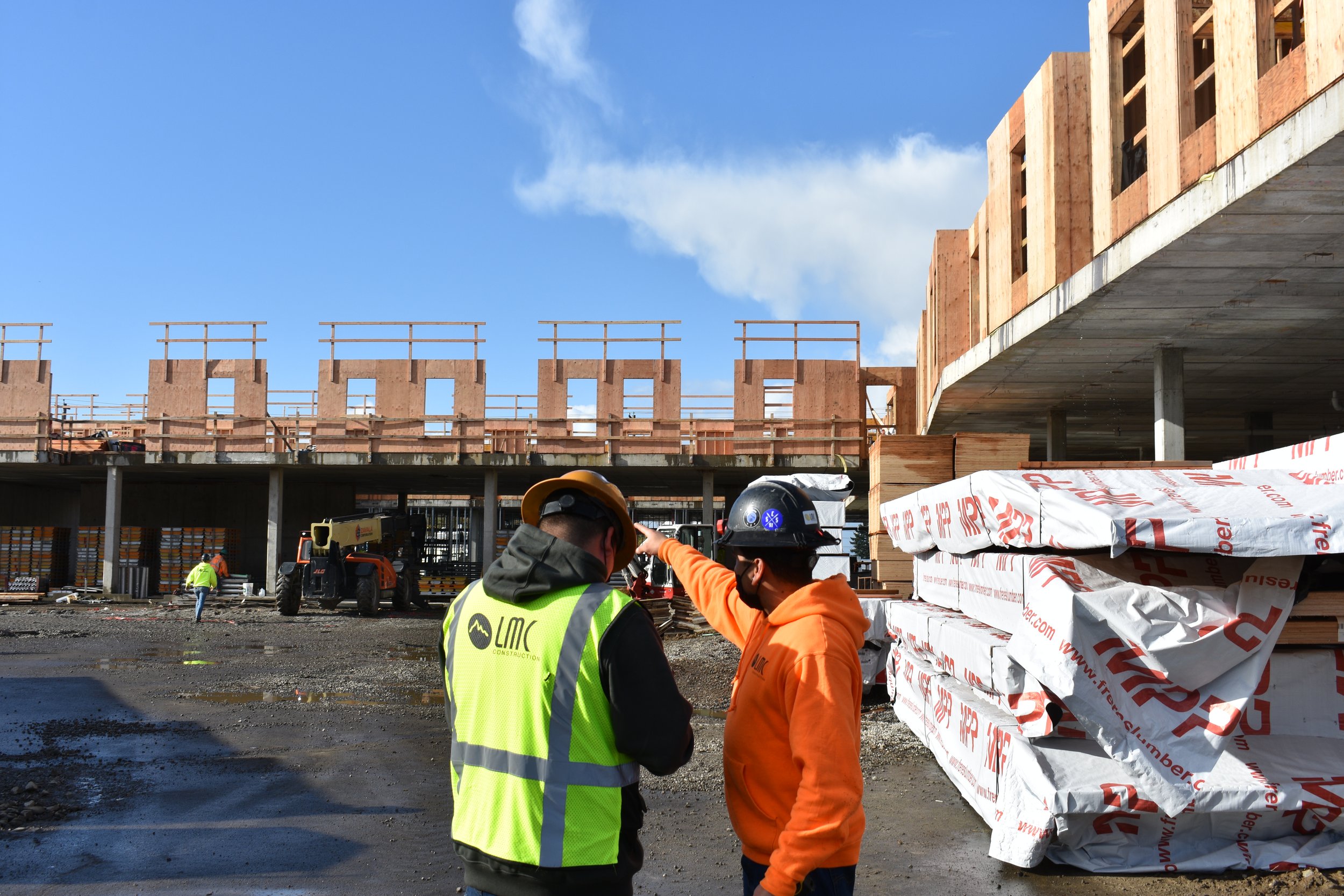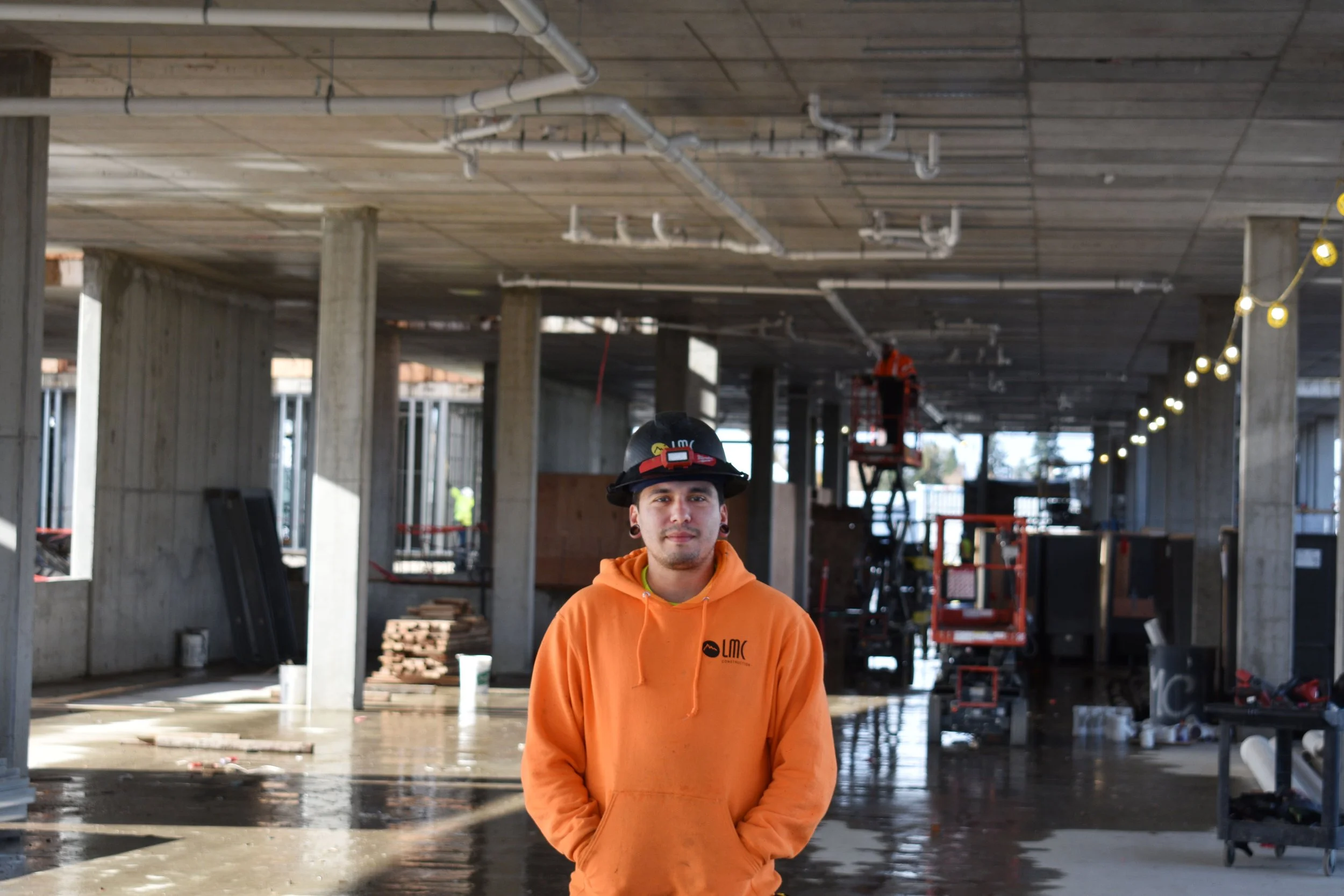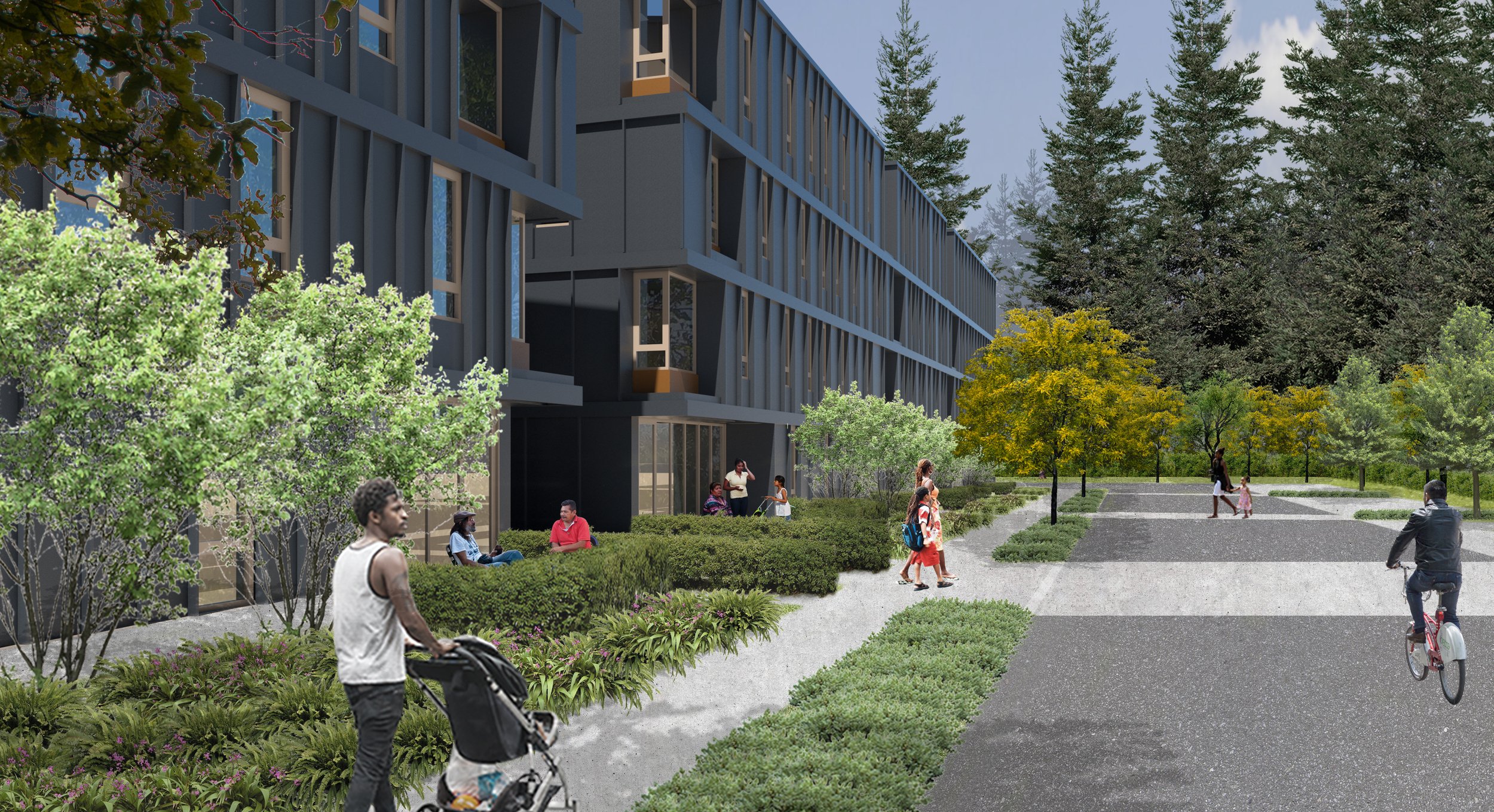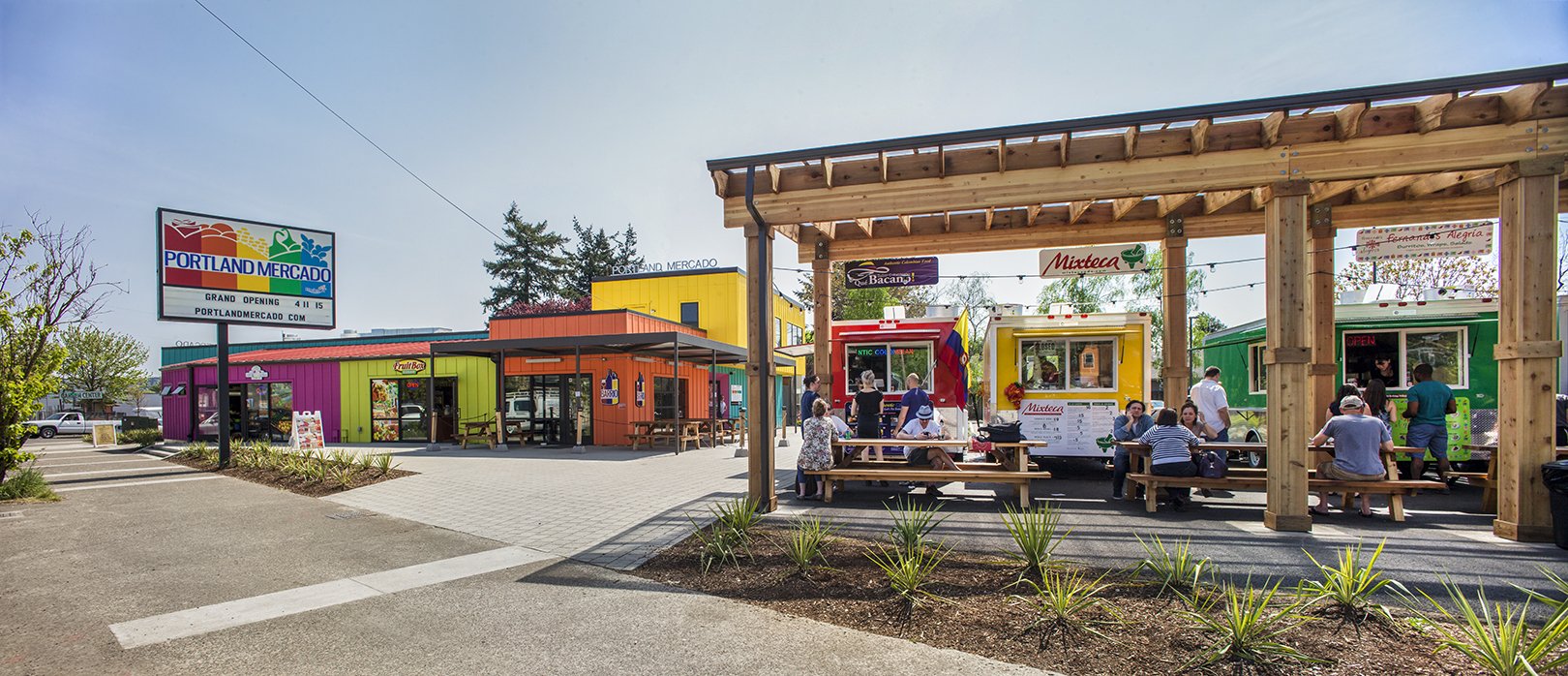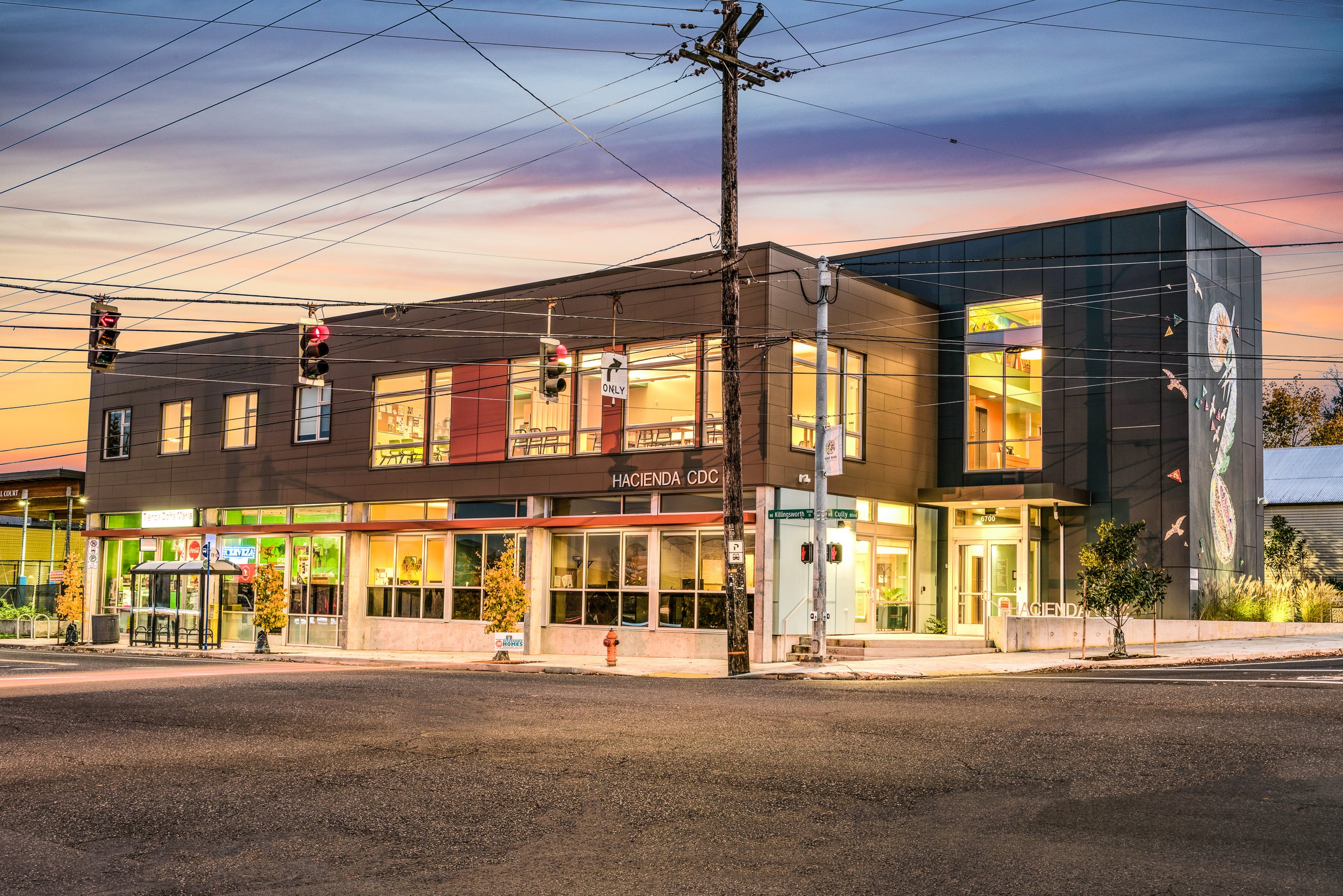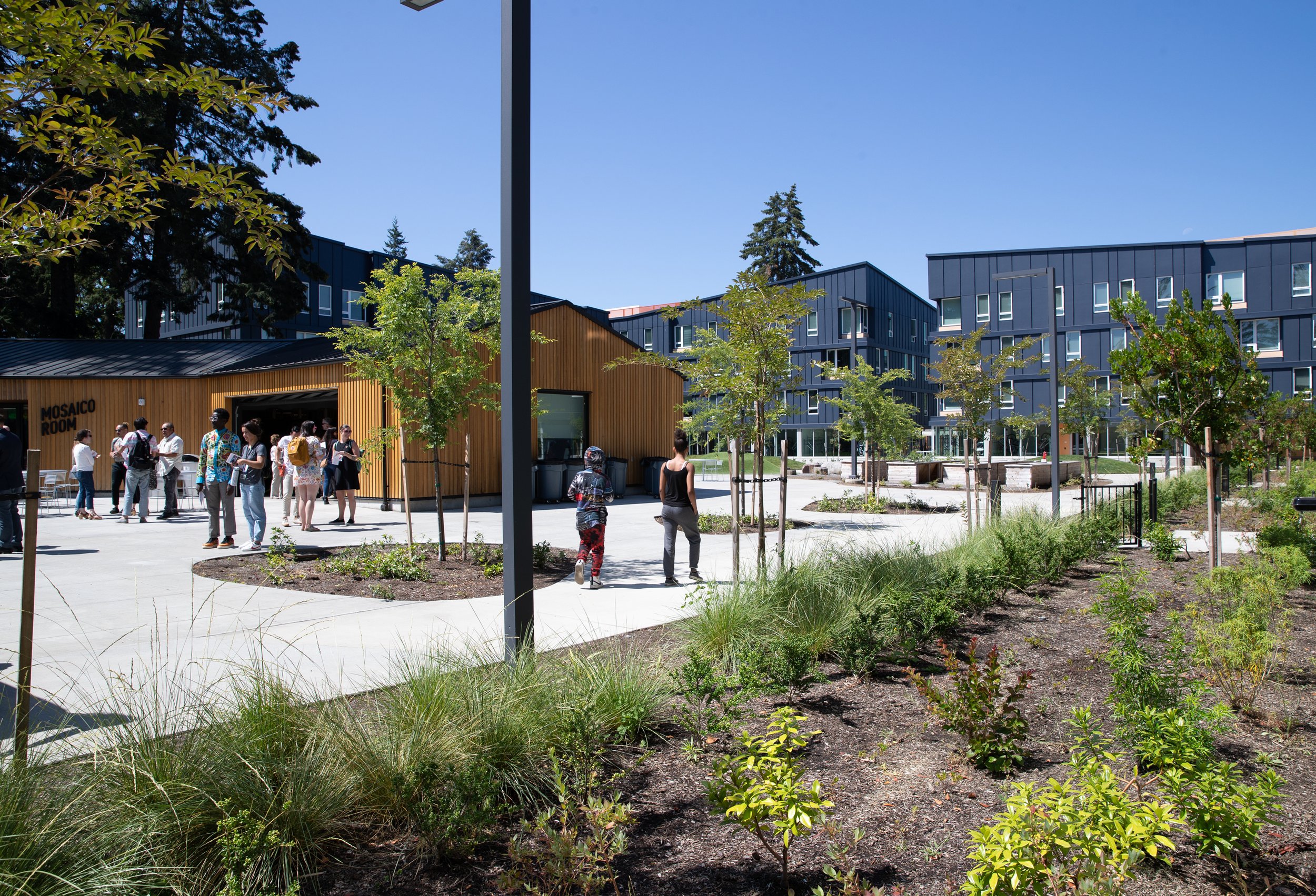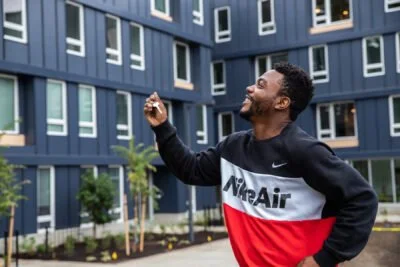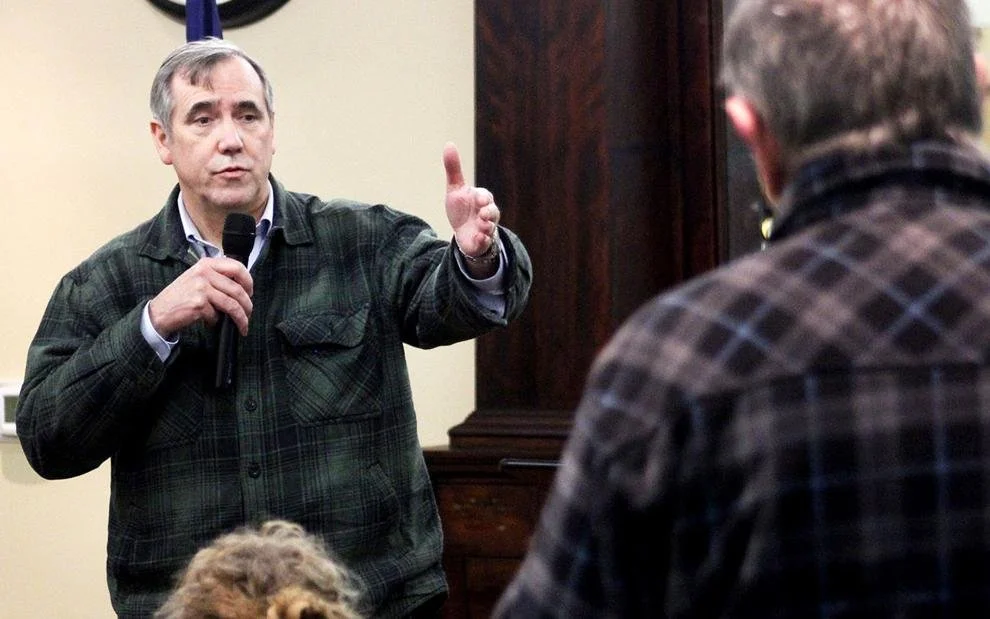“I work like a laborer, delegate like a foreman, and study like an intern,” says Saulo Quezada with a smile after a long day’s work. That’s how he describes LMC’s approach to developing his skills as a Foreman on the construction of Las Adelitas through a unique partnership between Verde and LMC.
Verde and Hacienda were early neighborhood partners in identifying the need to acquire and convert the Sugar Shack, a former strip club, into a community asset. Las Adelitas, which is under development by Hacienda with LMC as the general contractor, will include 142 units of affordable housing and is scheduled to be completed and welcome new residents in October 2022.
With the goals of continuing Verde’s participation and expanding the organization’s capacity to manage future projects, LMC and Verde agreed on a two-pronged approach: for Verde to assist LMC in the selection of a subcontractor to install the solar panel system and for Verde to hire a Foreman intern to be trained and mentored by LMC throughout the 18-month project construction schedule.
Now that the solar subcontractor, Neil Kelly/O’Neill Electric, has been selected, and Saulo’s been on the job for six months, those two paths are converging: Saulo has been assigned as the lead LMC contact for the solar panel array installation. “It’s a lot of responsibility. First I need to learn how the roof is constructed and then figure out how the array connects to it. I’ve been watching videos and studying the plans. I can go down rabbit holes real easy,” says Quezada.
A self-described former hoodlum from Santa Ana, CA, seven years ago Quezada, the son of Mexican immigrants, left behind a carefree lifestyle that consisted of working as a carpenter, taking college classes, surfing, skating, and boxing, as well as enjoying the close-knit network of family and friends in the largely Mexican-immigrant community. “I woke up from a dream one day where I saw my future, and I was disappointed. I hadn’t realized my full potential.” That same night, he bought the cheapest one-way ticket out. Never having visited Oregon before, he landed in Portland in September 2013 wearing shorts, a tank top, and no socks. “I didn’t even have a jacket. I had never experienced rain and dark nights like that before.”
Not knowing how long he’d stay, couch surfing, and relying on his savings, he slowly began piecing together odd jobs including bartending, sales, and the occasional construction gig. He made a commitment to stay when he moved into an apartment three months later. “I was either going to succeed or end up homeless,” he says. “No calling home for help or money.”
Curious by nature, Saulo found himself drawn to project management and teamwork. “I like to be in the mix,” he says, describing the process and sequence of events needed to turn an idea into a physical reality. This led to long-term employment with a local producer of custom wood coverings for high-end products. He could see the wood come in one door, and the finished product out the other, and enjoyed being part of every process in between.
In the meantime, Saulo had developed two new passions: cycling and social justice. His interest in cycling had started in Santa Ana as a cardio workout alternative to his boxing coach’s running assignments, but became a lifestyle when he started commuting and found a supportive community in Portland. Although familiar with low-income, Latinx, and immigrant communities, in Portland Quezada became more aware of other marginalized groups. He saw an opportunity to expand participation in cycling and began volunteering his time and skills with BikePOC, which assembles bikes and hosts rides to welcome people of color, women, and the LGBQT community into cycling.
By 2020, Saulo began thinking about how to incorporate these passions into his career plans. With a fresh resume and a solid track record, he applied to local cycling manufacturers as well as for two program management positions with Verde without success. A bit discouraged, it was then he received the call offering the Foreman internship. Verde had remembered his applications and thought this was the perfect fit.
“I was scared. It took me a month to think it over before accepting the position,” says Saulo. His main trepidation was the construction worker culture, where he had previously observed racist, sexist, and homophobic comments. “The work is hard enough, there’s no reason people should be subjected to that at the jobsite.” Quezada consulted with friends and decided his leadership could create space for more people, but he needed to establish clear boundaries.
Quezada says LMC’s Superintendent Bob Kantola set the standard from the very beginning: “Bob tells us it’s about the greater good.” Kantola, who has more than 40 years of construction experience, sits down with Saulo every week to go over the project plans and schedule, helping him to navigate the project management software, and to understand how the building’s elements fit together. “Bob’s built the environment, and Carlos is my main mentor, he helps me see, not just what’s happening today but also how it connects to three months from now.”
Saulo with Ernesto Fonseca, CEO of Hacienda CDC
The Las Adelitas story and Hacienda’s mission attracted Quezada to the job. “I wouldn’t have taken the position for just any construction project. It was Hacienda’s involvement and the community they serve that makes it matter. I want to see my people, Latinx, Africans, low-income, immigrants, LGBQT, etc. benefit from this work.” Quezada has described the project to his mother who is familiar with the Adelitas story and she tells him “Think of us, think of me.” Everyday he shows up to work with a smile because he sees the connection to his own past, knows he’s part of something bigger than himself, and is continuing to grow as a person. “I remind myself everyday: Hard Work. Dedication. Joy. Patience.”
Before arriving in Portland, Quezada thought he wasn’t meant to succeed. “I realize now the difference between success and failure is just not stopping. From cycling I learned about endurance and resilience. I need to keep pedaling, moving forward, and I’ll get there.” He is motivated by building opportunities for others, noting that children will see the mountains from the upper floors, as far as they can see will be views of something beautiful and the endless possibilities in the bigger world. “I can’t wait for this to be completed. I can see it now. We will have done something to elevate the next generation.”
Hacienda has seen a lot of growth this past year. With so many new developments and updates, we are showing up for our community now more than ever. We are proud to announce that Rockwood Village, the first metro-bonded housing to welcome residents, now has two new staff to support the community. Welcome to Hacienda!
Blanca Munoz Villarreal
RESIDENT SERVICES COORDINATOR
Mayra Jimenez
AFTER SCHOOL PROGRAM COORDINATOR
On December 14th, the Oregon Legislature, in Special Session, approved a $5 million appropriation for the Port of Portland and Hacienda Community Development Corporation to build prototypes of modular housing units, made from mass timber, that can be deployed to various sites throughout Oregon.
The mass timber modular manufacturing facility at the Port’s Marine Terminal 2 aims to support Oregon’s emerging mass timber industry, grow regional economic development opportunities, create career pathways and business opportunities for struggling communities, and accelerate housing production.
The Port and Hacienda joined together with the Oregon Mass Timber Coalition to create a strategy to accelerate housing production. Speaking to the Legislature, Curtis Robinhold, Executive Director of the Port of Portland, said: “Legislative funding will help pay for Hacienda CDC and the Port of Portland to develop, manufacture and deploy prototype modular houses made from mass timber in at least three Oregon communities in the next 12-24 months. The prototype housing units will be barged and trucked from Terminal 2 to communities throughout Oregon to provide housing opportunities to communities in need.”
Ernesto Fonseca, CEO of Hacienda CDC said: “Hacienda’s core mission is providing affordable housing for individuals and families in our community. As affordable housing needs continue to evolve, we are committed to exploring and advancing new ways to meet the needs of our diverse Oregon communities. This partnership with the Port of Portland fills a gap for modular housing developed right here in Oregon, providing not only new housing options but job opportunities and new markets for Oregon wood products. Additionally, developing modular homes will address construction labor shortages in smaller and rural Oregon communities and could offer rapid response options to address housing shortages created by emergencies, like wildfires. We appreciate the Legislature’s investment and the opportunity to partner with the Port of Portland.”
Robinhold continued, “Given the magnitude of need for more housing options for people at all income levels throughout Oregon, it’s clear that we need innovation and faster ways to produce homes. The modular home building industry is emerging, and no factories in Oregon are currently using mass timber technology. Prototyping will put existing research to a new use and demonstrate potential for new modular building concepts. Once tested, manufacturing can be scaled up leading to improved supply and reduced costs, reduced build times and less waste of materials.”
Following the creation of the prototype, Port of Portland and Hacienda will assess the economic, environmental and efficiency of creating these units at scale. Additional potential benefits cited by the partners include: additional jobs in manufacturing, construction and forestry; supporting Oregon’s emerging mass timber industry; and addressing severe housing shortages throughout the state.
Listen to Ernesto and Curtis discuss this project on OPB’s Think Out Loud.
About Port of Portland
Established in 1891 by the Oregon Legislature, the Port of Portland owns four marine terminals, three airports (Portland International, Hillsboro, and Troutdale) and five industrial parks. The mission of the Port is to enhance the region's economy and quality of life by providing efficient cargo and air passenger access to national and global markets.
About Hacienda CDC
Hacienda CDC was formed in 1986 to provide necessary housing and supportive services in a low-income, predominantly Latino community. Hacienda has since built 381 units of community-centered affordable rental housing in communities in North and Northeast Portland and in Molalla. Today, Hacienda is building new affordable housing in NE Portland and Gresham and will more than double the number of affordable homes they offer in the next two years. Hacienda embraces a holistic approach to development and serving Latinos and low-income individuals and families throughout Portland with programs in Community Economic Development, Homeownership Support, and Youth & Family Support Services. Hacienda has grown to become Oregon’s largest Latino-led, Latino-serving housing organization. As Portland’s Latino population has grown rapidly, Hacienda continues building capacity to offer bicultural services to Latinos and other low-income families throughout the Portland metropolitan area.
Want to help increase access to affordable housing in our community? Submit a Design Request for Proposal.
Hacienda partners with PBOT to distribute Transportation Wallet
Earlier this year, Portland Bureau of Transportation (PBOT) kicked off a new pilot program of the Transportation Wallet program for residents of affordable housing. The goal? To make it easier for residents to use the variety of transportation options available in our community. Thanks to this pilot, Hacienda’s Resident Services team distributed 60 Transportation Wallets to residents!
The Transportation Wallet is a collection of passes and credits for use on transit, streetcar, bike share and scooters, and Uber/Lyft created by the Portland Bureau of Transportation (PBOT). PBOT partnered with Hacienda and other community organizations to provide a package of transportation options incentives, known as the Transportation Wallet, for up to 500 residents in the participating housing developments – 60 of these were distributed through Hacienda.
Hacienda residents who met the eligibility requirements to participate in the transportation wallet pilot program processed their application through Hacienda’s Youth and Family Services, Resident Services.
Flavio Garcia, Resident Services Coordinator, said feedback from participants shows “…that for folks, this opportunity is really helpful as transportation costs have become a heavy burden. The residents who participated two years ago were grateful that the event was happening again, as the need for HOP passes has increased with people returning to work and school in person.”
“These programs are very necessary in our community,” says Jessica Lam, Resident Services Manager. “We hope the program grows to meet the demand of transportation.”
Resident Services Coordinator, Mohamed Ali added, “Some folks who don’t own a vehicle said to me that they had to purchase or reload their HOP pass for about $30-$45 a month and said that this program really helped them because they are unemployed.
More information on the pilot is available here.
Small Homes Northwest is a pilot project to build Accessory Dwelling Units (ADU’s) in backyards of moderate-income homeowners in Portland neighborhoods at risk of gentrification. We are thrilled to share that the Oregon Legislature passed a bill allocating a $1,000,000 grant to Hacienda to fund a demonstration project and create the opportunity for replication across the state.
We want to express our deep thanks to the Legislature, and specifically Representative Meek for sponsoring HB 3335 and co-sponsors Representatives Bynum, Leif, Pham, Ruiz, and Salinas, and Senators Frederick and Jama.
Our partners in this pilot include Bend/Redmond Habitat for Humanity and DevNW. Both joined us in advocating for this pilot project as a tool to create new affordable rental housing and to provide stability and asset-building for modest-income homeowners. Many community partners, including 1000 Friends of Oregon and the Oregon Housing Alliance provided letters and testimony in support of HB 3335.
Funding from the Legislature will allow us to demonstrate the model by building up to 10 affordable ADU’s, both in the Portland Metro area and across the state. This is a key innovation to help meet the growing need for affordable housing.
Our long-term hope is that this ADU model will give community organizations throughout Oregon a new tool to achieve the goals of adding modest residential density in single-family neighborhoods to help address our housing crisis.
A good example is Courtney Freeman, a hospital health educator and mom who lives in Portland just east of Northeast 82nd Avenue. Ms. Freeman says “I really worked hard on my way to being a homeowner… I know what it’s like to struggle and here I am, a homeowner. I’ve got this huge backyard, and here could be someone else that’s coming from either a similar situation or a not so similar situation. But we both can relate to the struggle. I looked at this as: here’s two people who can meet each other halfway and help each other.”
HB 335 was signed into law by the Governor on July 19 and will be administered by Oregon Housing and Community Services. Stay tuned for more updates we roll out the program in the coming months!
Rockwood Village is the first Metro bond-funded project to move in residents
Gresham, OR (September 1, 2021) – Rockwood Village, a new affordable housing community co-developed by Community Development Partners (CDP) and Hacienda CDC (Hacienda), welcomed the first 39 of 224 households last week. This milestone marks an exciting moment for the community and its new residents, and also for the 2018 voter-approved affordable housing bond measure, as this is the first Metro Bond-funded project to move in residents.
Rockwood Village is a new 7.4-acre, 224-unit affordable housing development located at 783 SE 185th Avenue in Gresham that includes five residential buildings, a community building, a privately funded public park, and an urban farm. The project was designed utilizing the principles of Asset Based Community Development to meet the needs of the community and includes a mix of one- to four-bedroom homes for households of a variety of sizes and income levels. The first residential building and the community building opened last week, and construction continues on the four remaining buildings, which are all scheduled to open by February 2022.
“It is exciting to meet our new residents as they move in and start this new chapter in their lives,” said Jessica Lam, Resident Services Manager with Hacienda. “Many said they are excited about the location and the opportunity to get back on their feet financially and are also interested in attending workshops we plan to host like health and wellness, financial coaching, gardening, and others.”
“I am most excited about meeting new people in the community,” said Christopher, a new resident.
“What I am most excited about is having my own place,” said Jose Ricardo, a new resident whose sentiment was shared by others.
“I am happy to know that Rockwood Village is opening to provide more affordable housing for families in Gresham, thanks to the investment voters made in 2018,” says Metro Councilor Shirley Craddick. “Rockwood Village is joining nine other developments in the greater Portland region partnering with Metro, like the Mary Ann in Beaverton and the Viewfinder in Tigard, to make available more affordable housing. These voter-approved investments are bearing fruit and will be assets to our community for decades to come. Everyone deserves a safe, stable place to live.”
“We are very happy to welcome the first residents to Rockwood Village,” says Gresham Mayor Travis Stovall. “Making sure everyone in Gresham has a stable and affordable place to call home is one of City Council’s top priorities. It is exciting to see the services provided by Hacienda CDC that will make this community a home. We are proud of the investments underway in our Rockwood neighborhood.”
“We are extremely proud of Rockwood Village and excited to welcome the first families,” said Eric Paine, CEO of Community Development Partners. “Providing affordable, human-centered housing designed with long-term community engagement in mind is what our mission is all about. We appreciate the City of Gresham and Metro for their investment and ongoing support of this project, and we’re incredibly grateful to the community stakeholders and local leaders who helped turn the vision of Rockwood Village into a reality.”
Hacienda is Co-Developer and Co-General Partner on the project alongside Community Development Partners. In addition, Hacienda will provide an array of resident services to strengthen and support families and individuals living in Rockwood Village and the surrounding community. On-site services will include after school and early childhood education, homeownership classes, and small business advising.
“For over 30 years we have been developing housing for Latino and low-income communities,” says Hacienda Chief Executive Officer, Ernesto Fonseca. “Developing 224 apartments that people can call home in Gresham is driven by one of our values, to serve our communities where they are. We are also excited to bring to the Rockwood community a robust set of services because we know that it takes more than housing to succeed.”
An important asset in this multi-acre development is the community building, or “Mosaico Room,” which features a full kitchen and flexible community space. Located at heart of the development, the Mosaico Room is designed to foster health, education, and social activities, and be a central place for Hacienda to host community classes and events.
Rockwood Village is also designed to encourage outdoor recreation with a new privately funded public park, “Neighbors Park.” Neighbors Park includes an outdoor playfield, meandering walking paths, picnic areas, a play area, and community gardens. The park will be open to the public when construction is complete in early 2022.
Rockwood Village was designed by Portland-based Waechter Architecture in collaboration with PLACE and PSU’s Center For Public Interest Design and is being built by LMC Construction. Funding for the project includes Metro Regional Affordable Housing Bond funds, 4% LIHTC equity/conduit bond financing, Oregon Housing and Community Services (OHCS) GHAP funds, OHCS Weatherization funds, equity and construction financing through KeyBank, and a permanent loan with Freddie Mac.
Rockwood Village will serve individuals and families earning 30%-70% of the area median income, with rents ranging between $500-$1,894 depending on floor plan and income level. Intended to meet the needs of larger family sizes, approximately 80% of the units are two-, three-, and four-bedrooms. Metro Regional Affordable Housing Bond funds were used to create units affordable to households making 30% or less of median family income.
Rockwood Village was also one of the first affordable housing development in Oregon to implement the IRS’ new Income Averaging guidelines for affordable housing, meaning development-wide the project will achieve an average AMI of 60% (approximately $58,020 for a family of four). Community m embers interested in exploring housing opportunities at Rockwood Village can learn more at rockwood-village.com. This work is possible through strategic partnerships with the City of Gresham, Metro, Oregon Housing & Community Services, Community Development Partners and Hacienda CDC.
_________________________________
About Community Development Partners
Founded in 2011, Community Development Partners develops and operates sustainable, life-enhancing affordable housing with a focus on long term community engagement and innovative design. As a mission-driven, forward-thinking organization, CDP is focused exclusively on creating vibrant affordable housing communities that incorporate art, public parks, gardens, fresh food, and cultural and social programming. Today, CDP has successfully built or preserved 35 unique projects comprised of over 2,800 units throughout Oregon, California, Nevada, and Arizona.
About Hacienda CDC
Hacienda CDC is a Latino Community Development Corporation that strengthens families by providing affordable housing, homeownership support, economic advancement, and educational opportunities. Hacienda owns 381 affordable housing units in North and Northeast Portland and Molalla, providing safe, stable homes for over 1,500 individuals each year, over half of whom are children. Hacienda embraces a holistic approach to development with programs in Community Economic Development, Homeownership Support, and Youth and Family Support Services.
The Oregon Food Bank has partnered with the Baltazar Ortiz Center to hold weekly Mercadito (food pantry) for the community. Every Wednesday between 12:30 pm and 2:00 pm.
El Banco de Alimentos de Oregon se ha asociado con el Centro Baltazar Ortiz para realizar un Mercadito (despensa de alimentos) semanal para la comunidad. Todos los miércoles de 12:30 pm a 2:00 pm.
6736 NE Killingsworth St, Portland, OR 97218
Hacienda Programs Update
Youth and Family Services
We are pausing all face to face services, including Portland Niños, Expresiones, and SUN Youth Advocacy for the time being. Staff will check in with all youth in our programs by phone daily and all in-home visits will be conducted by phone. We will work with families to ensure safe delivery of necessary supplies, like diapers, over this time.
Homeownership Support
We are working to schedule all of our homeownership counseling, mortgage lending and foreclosure prevention counseling programs to telephone meetings to limit in person contact. In-person meetings will not be scheduled at this time and we will not be able see clients that walk-in without an appointment.
Portland Mercado
We have suspended all special events at the Mercado until it is safe to resume. Mercado vendors will continue to operate, primarily focused on take-out and delivery orders. We have 19 small businesses at the Mercado, 60 small businesses in our advising program, and 90 who use the commercial kitchen. We will help them track the economic impact in the hope that small business assistance will be available. We know that will be critical to their survival.
Residents
We are very concerned about the economic impact our families will face. We fully anticipate many will have trouble making rent payments over the coming months due to lost wages or employment. Housing stability is our number one priority. We will be flexible with tenants impacted by COVID 19 so their housing stability is not compromised.


